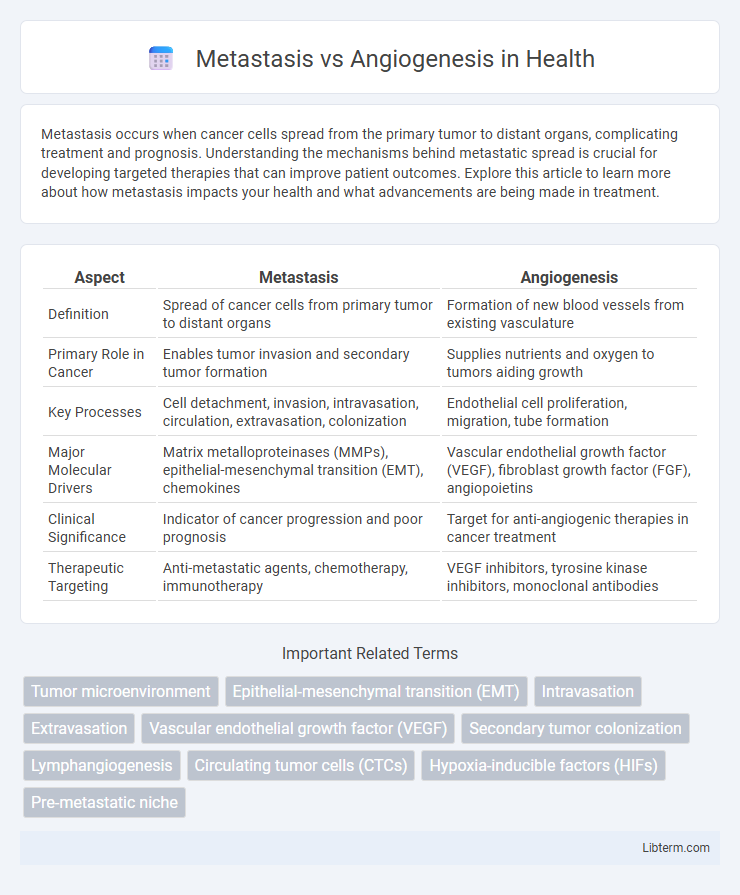Metastasis occurs when cancer cells spread from the primary tumor to distant organs, complicating treatment and prognosis. Understanding the mechanisms behind metastatic spread is crucial for developing targeted therapies that can improve patient outcomes. Explore this article to learn more about how metastasis impacts your health and what advancements are being made in treatment.
Table of Comparison
| Aspect | Metastasis | Angiogenesis |
|---|---|---|
| Definition | Spread of cancer cells from primary tumor to distant organs | Formation of new blood vessels from existing vasculature |
| Primary Role in Cancer | Enables tumor invasion and secondary tumor formation | Supplies nutrients and oxygen to tumors aiding growth |
| Key Processes | Cell detachment, invasion, intravasation, circulation, extravasation, colonization | Endothelial cell proliferation, migration, tube formation |
| Major Molecular Drivers | Matrix metalloproteinases (MMPs), epithelial-mesenchymal transition (EMT), chemokines | Vascular endothelial growth factor (VEGF), fibroblast growth factor (FGF), angiopoietins |
| Clinical Significance | Indicator of cancer progression and poor prognosis | Target for anti-angiogenic therapies in cancer treatment |
| Therapeutic Targeting | Anti-metastatic agents, chemotherapy, immunotherapy | VEGF inhibitors, tyrosine kinase inhibitors, monoclonal antibodies |
Defining Metastasis and Angiogenesis
Metastasis is the process by which cancer cells spread from the primary tumor to distant organs, forming secondary tumors and complicating disease treatment. Angiogenesis refers to the formation of new blood vessels from pre-existing vasculature, supplying nutrients and oxygen essential for tumor growth and survival. Understanding the distinction between metastasis, involving cancer cell dissemination, and angiogenesis, involving vascular development, is crucial for targeting cancer progression effectively.
Key Differences Between Metastasis and Angiogenesis
Metastasis involves the spread of cancer cells from the primary tumor to distant tissues, whereas angiogenesis is the process by which new blood vessels form from existing vasculature to supply nutrients to tumors. Metastasis requires cancer cell detachment, invasion, and colonization, while angiogenesis focuses on endothelial cell proliferation and migration to build vascular networks. Key molecular drivers differ as well; metastasis is often driven by epithelial-mesenchymal transition (EMT) and matrix metalloproteinases (MMPs), whereas angiogenesis is primarily regulated by vascular endothelial growth factor (VEGF) and other pro-angiogenic factors.
Biological Mechanisms of Metastasis
Metastasis involves the complex biological mechanism where cancer cells detach from the primary tumor, invade surrounding tissues, enter the bloodstream or lymphatic system, and form secondary tumors in distant organs. Key processes include epithelial-mesenchymal transition (EMT), degradation of the extracellular matrix by matrix metalloproteinases (MMPs), and intravasation into blood vessels. Unlike angiogenesis, which promotes new blood vessel formation to supply tumors, metastasis requires cancer cells to migrate and adapt to new microenvironments for successful colonization.
Process and Pathways of Angiogenesis
Angiogenesis is the physiological process involving the growth of new blood vessels from pre-existing vasculature, primarily regulated by signaling pathways such as VEGF (vascular endothelial growth factor) and FGF (fibroblast growth factor), which activate endothelial cell proliferation and migration. This process contrasts with metastasis, where cancer cells detach, invade surrounding tissues, and disseminate through circulation to establish secondary tumors. Angiogenesis supports tumor growth by supplying oxygen and nutrients, facilitating pathways like PI3K/Akt and MAPK that enhance endothelial survival and vessel formation.
Molecular Signaling in Metastasis
Molecular signaling in metastasis involves key pathways such as epithelial-mesenchymal transition (EMT), driven by transcription factors like Snail, Twist, and ZEB, which facilitate cancer cell detachment and invasion. Integrin-mediated signaling and matrix metalloproteinases (MMPs) degrade extracellular matrix components, enabling tumor cell migration through tissue barriers. Additionally, signaling pathways including PI3K/Akt, MAPK, and TGF-b modulate survival, motility, and intravasation of metastatic cells, distinguishing metastasis molecular mechanisms from those primarily involved in angiogenesis.
Angiogenic Factors and Their Roles
Angiogenic factors such as vascular endothelial growth factor (VEGF), fibroblast growth factor (FGF), and angiopoietins play critical roles in promoting new blood vessel formation, which supports tumor growth and metastasis. VEGF primarily stimulates endothelial cell proliferation and increases vascular permeability, facilitating nutrient supply to cancer cells and enabling metastatic dissemination. FGF and angiopoietins contribute to vessel maturation and stabilization, enhancing the tumor microenvironment's capacity to sustain aggressive cancer progression.
Clinical Implications of Metastasis
Metastasis involves the spread of cancer cells from the primary tumor to distant organs, significantly worsening patient prognosis and complicating treatment strategies. Clinical implications of metastasis include increased tumor heterogeneity, resistance to conventional therapies, and the need for systemic treatment approaches such as chemotherapy, targeted therapies, and immunotherapy. Early detection of metastatic lesions through advanced imaging and biomarker analysis is crucial for improving survival rates and tailoring personalized treatment plans.
Therapeutic Strategies Targeting Angiogenesis
Therapeutic strategies targeting angiogenesis focus on inhibiting the formation of new blood vessels that supply nutrients to tumors, thereby restricting tumor growth and metastasis. Agents such as bevacizumab, an anti-VEGF monoclonal antibody, and tyrosine kinase inhibitors like sunitinib disrupt angiogenic signaling pathways critical for endothelial cell proliferation and migration. These anti-angiogenic therapies complement metastatic treatment by reducing vascularization, limiting cancer cell dissemination, and improving patient outcomes in various solid tumors.
Metastasis and Angiogenesis in Tumor Progression
Metastasis and angiogenesis are critical processes in tumor progression, where metastasis refers to the spread of cancer cells from the primary tumor to distant organs, significantly contributing to cancer morbidity and mortality. Angiogenesis, the formation of new blood vessels from existing vasculature, supports tumor growth by supplying oxygen and nutrients, enabling expansion and providing routes for metastatic dissemination. The interplay between angiogenesis and metastasis facilitates tumor invasion, with angiogenic factors like VEGF promoting vascular permeability and cancer cell intravasation essential for metastasis.
Future Directions in Cancer Research: Metastasis vs Angiogenesis
Emerging cancer research is increasingly targeting the interplay between metastasis and angiogenesis to develop more effective therapies, focusing on inhibiting signaling pathways like VEGF and EMT regulators that facilitate tumor spread and vascular growth. Innovative approaches include exploring the tumor microenvironment's role in enabling metastatic niches and angiogenic switch activation, utilizing advanced single-cell sequencing and molecular imaging to identify key biomarkers. Continued integration of immunotherapy with anti-angiogenic and anti-metastatic agents offers promising avenues to disrupt cancer progression and improve patient outcomes.
Metastasis Infographic

 libterm.com
libterm.com